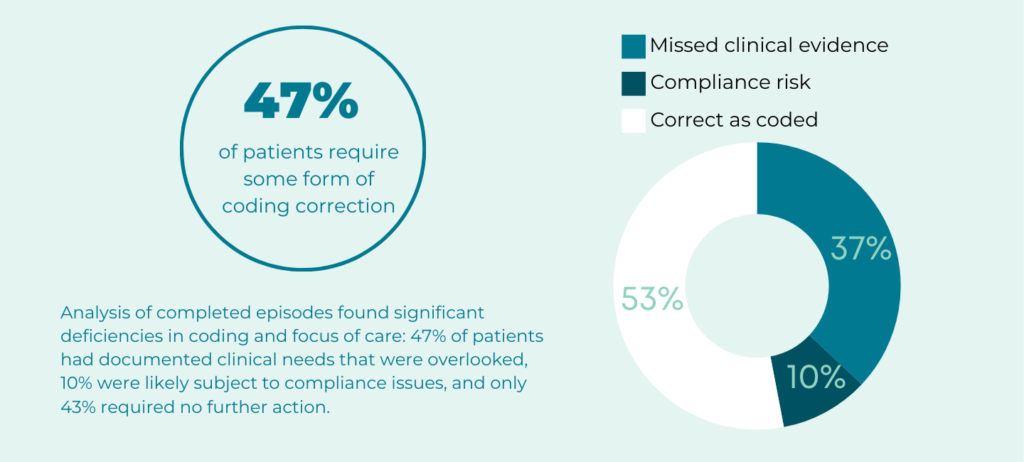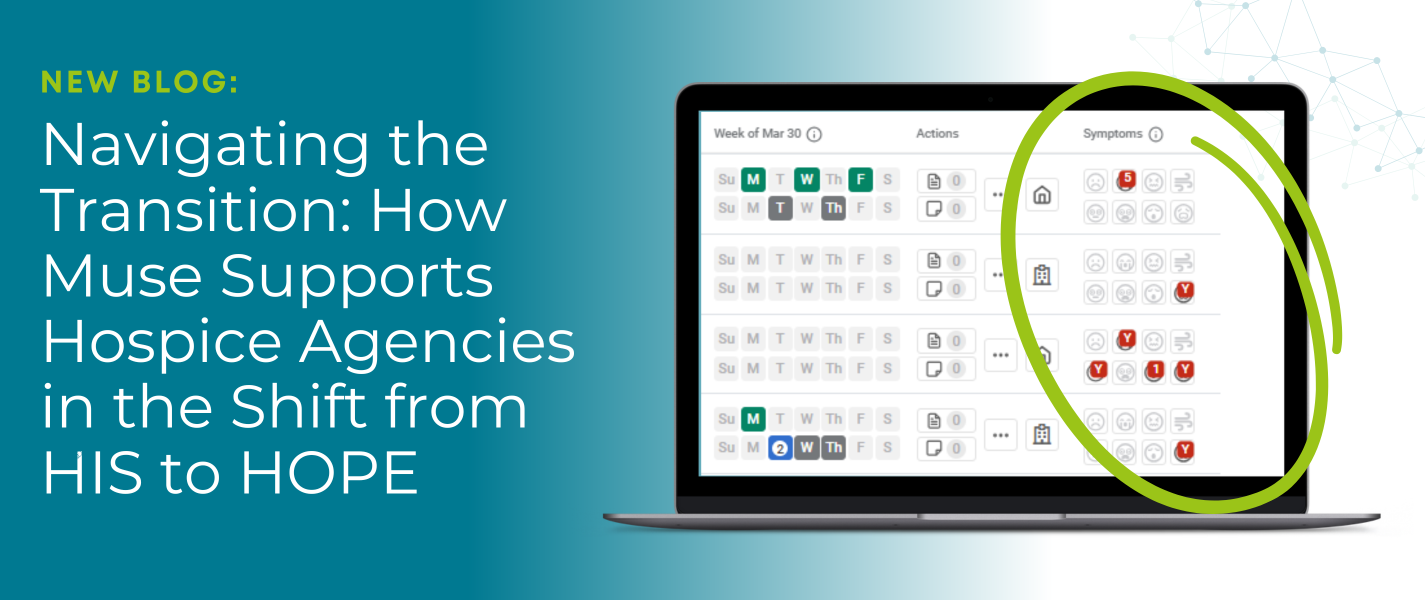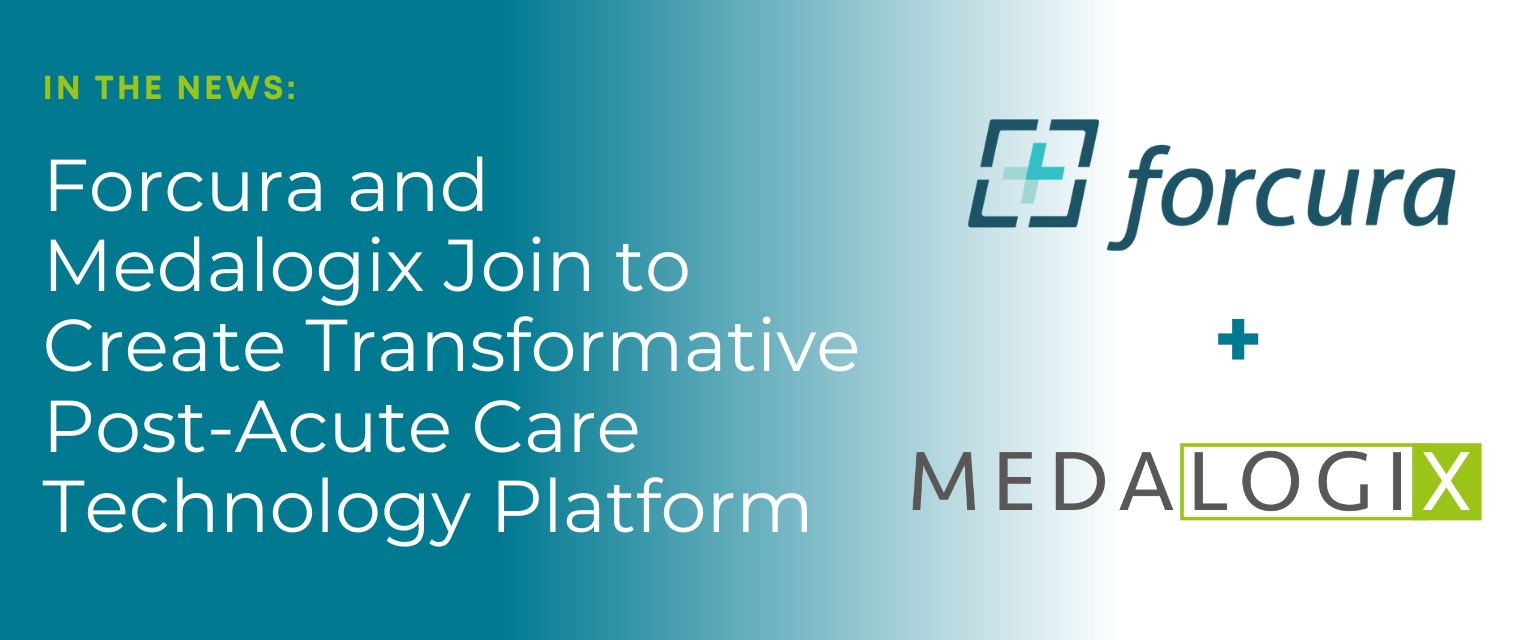Driving an improved home health patient experience with Pulse
The Medalogix suite of products spans a patient’s full home health experience, from referral into a home health setting through to evaluation for hospice eligibility. As such, there are numerous points throughout the patient’s healthcare journey where their experience and care quality are directly improved by interventions driven by Medalogix’s data science and machine learning. Specifically, within the home health space, as it furthers its evolution into a value-based care environment, patients are better served by agencies that successfully adopt Medalogix solutions, which help providers develop the right (i) plan of care, (ii) resource utilization and care coordination, and (iii) care setting.
Medalogix provides a holistic solution for patients through their whole home health journey
Home health agencies continue to seek operational efficiencies, quality improvements, and other ways to strengthen their business. The right technologies, however, benefit both agencies and patients alike. In the value-based care environment, operational streamlining and new protocols for their own sake aren’t enough. Real-world impacts on the patient must be at the center of every decision, meaning agencies should ask themselves if any change they make will improve the patient’s outcomes. As the patient experiences better preparedness and more responsive care, quality measures will improve.
From starting off with a good first impression at intake to ending the care experience with timely and compassionate end-of-life care, agencies can benefit in numerous ways from Medalogix solutions. With that in mind, let’s look at just a few points during the patient journey where interventions driven by machine learning and AI are making a difference:
Pulse Referrals & Admissions drives more accurate care planning
When a patient is referred from an acute care setting to home health, the admission process can be time-consuming and overly complicated when performed manually or with legacy solutions. The home health referral acceptance rate has cratered since COVID, and while it’s not at an all-time low (this was reached in Q4 2022), it’s not much better. In response, hospitals now send more referrals per patient, with Medicare Advantage patients seeing 6+ referrals to get acceptance. This can mean uncertainty and a wait for patients, so they’re already starting off with a potentially stressful experience.
For any patient dealing with uncertainty during a transition in care setting, working with an agency that consistently gets intake and admission right is a relief. Care plans are based on a care team’s best understanding of a given patient’s needs and condition. This understanding is rooted in clinical evidence contained in the patient record. The length and complexity of patient records make complete and accurate understanding of patient condition difficult, particularly at the start of care. It’s easy for agencies to miss something coming in, or for admitting clinicians to be underprepared for a first visit. This perpetuates any anxiety the patient may be feeling.
Pulse Referrals & Admissions helps home health agencies start patients off right, building trust and comfort from the first visit. Digging deep into referral records, comprehensive assessments, and clinician narratives, Referrals & Admissions identifies information in the patient record that may be missing or conflicting. This allows for documentation improvement that drives in turn improvements to care planning. In a study of completed episodes, Medalogix found that 47% of patients required some form of coding correction, either for something that was missed or for a compliance risk. By correcting these issues, the patient can ultimately experience better care that aligns to their condition.

Pulse Episodes helps patients receive a consistently responsive care experience after their condition changes
After admission, and throughout any episode, most patients’ needs aren’t static. They experience ups and downs, and their care plan should change correspondingly. When a patient’s risk profile rises because of new developments, it’s imperative that care teams respond in a timely manner. Without Medalogix, unfortunately, care teams are largely left in the dark, with visits and resource utilization remaining unchanged until a patient’s condition worsens further. Without guidance into which patients have elevated risk and would most benefit from added attention, clinicians’ efforts are inefficiently allocated. As the patient experiences gaps in care relative to their newly worsened condition, their impression of and trust in their care team can weaken.
Pulse Episodes enables care teams to focus on patients with elevated risk levels, particularly those who have experienced a Sudden Decline in Condition. With highlights both in individual patient records and in the patient census, home health clinicians can clearly see where to direct their attention to proactively address real-time patient needs. This drives responsive utilization and visit adjustments to potentially prevent further decline. The patient experiences this as intuitive, responsive care and recognizes that while their condition has worsened, their support system has kept pace. The impacts on quality metrics that flow from this improved patient experience mean that doing right by the patient is also what’s best for the agency.
Pulse Transitions helps more patients take full advantage of their hospice benefits
For both patients and their families, the most vulnerable time in their care journey comes as they begin to draw closer to end-of-life care. In a situation where the patient’s condition has continually worsened, and their mortality risk has increased, it’s more important than ever for agencies to provide compassionate and responsive care.
The National Hospice and Palliative Care Organization (NHPCO) found that 54% of hospice patients only receive their hospice benefit for 30 days or less. This means that without the help of predictive analytics, agencies are failing to identify strong hospice candidates in a timely manner more than half the time. Far too many patients don’t receive their full hospice benefit because they transition too late or not at all. An appropriate level and type of care as patients draw closer to death is essential, but the additional resources hospice offers vs. home health are being missed out on.
Pulse Transitions uses breakthrough data science to identify patients likely to pass away in the next 60 days and provides easy workflows to help home health teams with hospice evaluation. Transition navigators and clinical managers benefit from shared visibility into the evaluation process and can exchange notes to facilitate care coordination. This helps more patients who should be in hospice spend more time there. As a result, patients and their families receive timely education resources, comfort, and a better balance of spiritual, physical, and emotional care in a trying time.
Some final thoughts
The home health and space is full of caring, driven, and talented professionals who work diligently to give patients an exceptional experience. But staffing limitations, complicated records, unanticipated changes, and other challenges can get in the way. The good news is that with the right technology partner, agencies can receive clinical evidence-driven insights to drive better care than ever. There are many more points during the patient journey where the Medalogix suite has a demonstrably positive impact on the patient experience, but these are a good place to start.
Patients of Medalogix clients can expect care that has been planned well from the beginning (Referrals & Admissions), adapts to their changing needs (Episodes), and ensures they spend their final days in the best setting for them and their families (Transitions). Clients like Mission Healthcare and others are already seeing these benefits. To learn more, visit our Pulse platform page: Pulse – Medalogix.
Related Blogs

Navigating the Transition: How Medalogix Muse Supports Hospice Agencies in the Shift from HIS to HOPE
Authored by: Steven Shelton, MBA, MSN, RN, CHPN; Senior Director, Clinic...

Forcura and Medalogix Join to Create Transformative Post-Acute Care Technology Platform
Berkshire Partners Will Serve as Lead Investor in the New Platform, with...

HHVBP: A Winning Strategy for Home Health Providers
The start of 2025 has ushered in a wave of new realities for Home Health...


